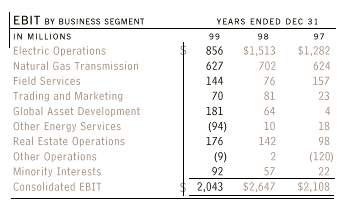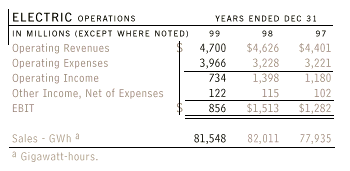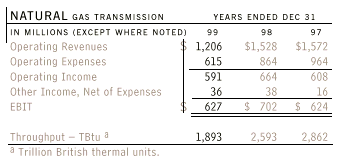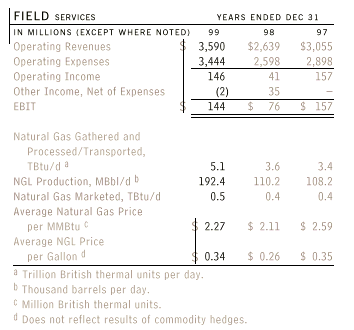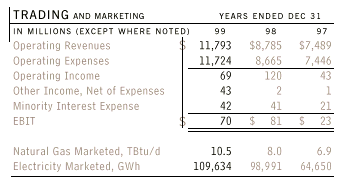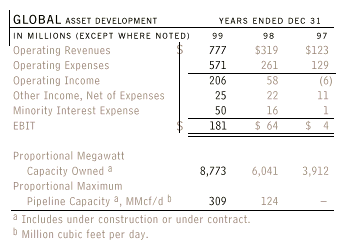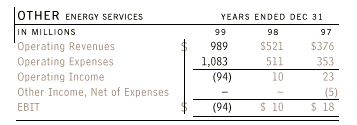
|
| Introduction |
|
| Results of Operations |
|
| Liquidity and Capital Resources |
|
| Quantitative and Qualitative Disclosures about Market Risk |
|
| Current Issues |
RESULTS OF OPERATIONS
In 1999, earnings available for common stockholders were $1,487 million, or $4.08 per basic share, net of an after-tax extraordinary gain of $660 million, or $1.82 per basic share. In 1998, earnings available for common stockholders were $1,231 million, or $3.41 per basic share, net of an after-tax extraordinary loss of $8 million, or $0.02 per basic share. The increase in earnings available for common stockholders was primarily due to the 1999 extraordinary gain resulting from the sale of the Midwest Pipelines. This gain, along with the factors described below that affect segment profit and loss, was partially offset by a pre-tax $800 million charge for estimated injury and damages claims (see Note 14 to the Consolidated Financial Statements), higher interest expense and minority interest expense.
Earnings available for common stockholders increased $329 million in 1998 from 1997 earnings of $902 million, or $2.51 per basic share. The increase in earnings available for common stockholders was due to the factors described below that affect segment profit and loss. These factors were partially offset by increased interest expense and minority interests.
Operating income for 1999 was $1,795 million compared to $2,433 million in 1998 and $1,970 million in 1997. Earnings before interest and taxes (EBIT) were $2,043 million, $2,647 million and $2,108 million for 1999, 1998 and 1997, respectively. Management evaluates each business segment based on an internal measure of earnings before interest and taxes, after deducting minority interests. Operating Income and EBIT are affected by the same fluctuations for Duke Energy and each of its business segments. The only notable difference between Operating Income and EBIT is the inclusion in EBIT of certain non-operating activities. See Note 3 to the Consolidated Financial Statements for additional information on business segments.
EBIT is summarized in the following table and is discussed by business segment thereafter.
Other Operations primarily include communication services, water services and certain unallocated corporate costs. Included in the amounts discussed hereafter are intercompany transactions that are eliminated in the Consolidated Financial Statements.
In 1999, EBIT for Electric Operations decreased $657 million compared to 1998, primarily due to an $800 million charge for estimated injury and damages claims. See Note 14 to the Consolidated Financial Statements for additional information related to this charge. Partially offsetting this decrease was a 2.8% increase in the number of customers in the Electric Operations' service territory during 1999, and the absence of 1998 severance and other costs related to closing Electric Operations' merchandising business.
In 1998, EBIT for Electric Operations increased $231 million as compared to 1997, primarily due to a 5.2% increase in gigawatt-hour sales. Gigawatt-hour sales increased as a result of warmer spring and summer weather conditions during 1998 and a 2.5% growth in the number of customers in the Electric Operations' service territory. EBIT also increased due to the absence of 1997 severance costs, however this was substantially offset by 1998 costs related to the closing of Electric Operations' merchandising business.
EBIT for Natural Gas Transmission decreased $75 million in 1999 compared to 1998. As a result of the sale of the Midwest Pipelines to CMS Energy Corporation (CMS) on March 29, 1999, EBIT for the Midwest Pipelines decreased $156 million compared to 1998's full year of operation. For the Northeast Pipelines, EBIT increased $81 million compared to 1998, primarily as a result of increased earnings from market-expansion projects and joint ventures, higher throughput and lower operating expenses. A gain of $24 million resulting from the sale of Duke Energy's interest in the Alliance Pipeline project and benefits totaling $38 million related to the completion of certain PCB (polychlorinated biphenyl) and soil clean-up programs below estimates also increased EBIT in 1999. Partially offsetting these contributions to EBIT were the non-recurrence of the 1998 favorable resolution of regulatory issues related to gas supply realignment cost issues ("GSR issues") and a 1998 refund from a state property tax ruling.
In 1998, EBIT for Natural Gas Transmission increased $78 million compared to 1997. EBIT for the Northeast Pipelines increased $56 million in 1998 over 1997, primarily as a result of the favorable resolution of GSR issues, favorable state property tax rulings and increased market expansion projects. These increases were partially offset by a decrease in throughput primarily as a result of mild winter weather.
For the Midwest Pipelines, 1998 EBIT increased $22 million compared to 1997, primarily due to a gain on the sale of the general partner interests in Northern Border Partners, L. P. and non-recurring 1997 litigation expenses. These increases were partially offset by the favorable resolution of certain regulatory matters in 1997, which was reflected as additional revenue and other income.
In 1999, EBIT for Field Services increased $68 million compared to 1998. A significant portion of the increase resulted from the March 31, 1999 acquisition of the natural gas gathering, processing, fractionation and NGL pipeline business from Union Pacific Resources (UPR), (collectively, the "UPR acquisition"). For more information on the UPR acquisition, see Note 2 to the Consolidated Financial Statements. Improved average NGL prices, which were up $0.08 per gallon, or 30.8% from the prior year, also contributed to the increase in EBIT. Partially offsetting these increases were $34 million in 1998 of gains on sales of assets, which were included in other income.
EBIT for Field Services decreased $81 million in 1998 from 1997, primarily due to a decrease in average NGL prices of approximately $0.09 per gallon, or 25.7%. The decrease in EBIT was partially offset by $34 million of gains on sales of assets, which were included in other income.
On December 16, 1999, Duke Energy announced that it had signed definitive agreements with Phillips Petroleum to form a new midstream gas gathering and processing company. See Note 19 to the Consolidated Financial Statements for further discussion.
In 1999, EBIT for Trading and Marketing decreased $11 million from 1998. The decrease resulted primarily from lower natural gas trading margins, partially offset by higher electricity trading margins as well as margins associated with other trading activities and sales of natural gas interests associated with drilling activities.
EBIT for Trading and Marketing increased $58 million in 1998 compared to 1997. The increase resulted primarily from increased trading margins and electricity margins, partially offset by increased expenses due to business growth. Electricity volumes marketed increased primarily as a result of acquiring the remaining 50% ownership interest in the Duke/ Louis Dreyfus, L.L.C. (D/LD) joint venture in June 1997.
In 1999, EBIT for Global Asset Development increased $117 million compared to 1998. The increase includes $99 million in income from the sale of partial interests in four generating stations in the U.S. as a result of executing its domestic portfolio management strategy. Earnings from new projects in Latin America and Australia also contributed $63 million to the increase. Partially offsetting these increases were higher operating expenses and increased development costs associated with business expansion.
EBIT for Global Asset Development increased $60 million in 1998 over 1997. The increase resulted primarily from business expansion and acquisitions, including the July 1998 acquisition of three electric generating stations in California and the December 1997 acquisition of an indirect 32.5% ownership interest in American Ref-Fuel Company. An expansion to the PT Puncakjaya power generation facility in Indonesia also contributed to the increase in EBIT during 1998. The increase in EBIT was partially offset by decreased earnings resulting from lower prices at National Methanol Company, a methanol and MTBE (methyl tertiary butyl ether) business in Saudi Arabia.
In 1999, EBIT for Other Energy Services decreased $104 million compared to 1998. The decrease was primarily due to charges of $38 million and $35 million at Duke Engineering & Services and DukeSolutions, respectively. These charges, which include costs associated with repositioning the companies to focus on growth markets, included expenses related to severance, office closings and write-offs of uncollectable accounts. Increased development activity at DukeSolutions and decreased earnings from projects of Duke Engineering & Services also contributed to lower EBIT. EBIT for Other Energy Services decreased $8 million in 1998 compared to 1997, primarily due to reduced earnings of Duke Engineering & Services.
In 1999, EBIT for Real Estate Operations increased $34 million compared to 1998. The increase was primarily due to increased residential developed lot sales, land sales and commercial project sales, partially offset by decreased lake lot sales. EBIT for Real Estate Operations increased $44 million in 1998 over 1997, primarily as a result of increased commercial project sales, lake lot sales and land sales, including a gain on the sale of land in the Jocassee Gorges region of South Carolina.
-OTHER OPERATIONS
EBIT for Other Operations decreased $11 million in 1999 compared to 1998, primarily as a result of the resolution of certain contingent items during 1998. EBIT for Other Operations increased $122 million in 1998 compared to 1997, primarily as a result of the absence of $71 million of non-recurring 1997 merger-related costs and the favorable resolution of certain contingent items in 1998, partially offset by a 1997 gain on the sale of Duke Energy's ownership interest in the Midland Cogeneration Venture.-OTHER IMPACTS ON EARNINGS AVAILABLE FOR COMMON STOCKHOLDERS
Interest expense increased $87 million in 1999 compared to 1998, and $42 million in 1998 compared to 1997 due to higher average debt balances outstanding, resulting from acquisitions and expansion.Minority interests increased $46 million in 1999 compared to 1998, and $73 million in 1998 compared to 1997. The increases were due primarily to regular distributions paid on new issuances of Duke Energy's trust preferred securities. For more information on issuances of trust preferred securities, see Note 12 to the Consolidated Financial Statements. Excluding these dividends, minority interests related primarily to Global Asset Development's 1999 investments and Trading and Marketing's joint venture with Mobil Corporation. For more information regarding acquisitions and new projects, see Notes 2 and 8 to the Consolidated Financial Statements.
Duke Energy's effective income tax rate was approximately 35%, 38% and 40% for 1999, 1998 and 1997, respectively. The decrease in 1999 from 1998 was primarily due to the favorable resolution of several income tax issues and the utilization of certain capital loss carryforwards due to the sale of the Midwest Pipelines. Favorable resolution of income tax issues also resulted in a decline in the effective tax rate in 1998 from 1997. Duke Energy expects its ongoing effective tax rate to approximate 38%.
The sale of the Midwest Pipelines to CMS closed on March 29, 1999 and resulted in a $660 million extraordinary gain, net of income tax of $404 million. For further discussion on the sale, see Note 2 to the Consolidated Financial Statements.
In January 1998, TEPPCO Partners, L.P., in which Duke Energy has a 21.1% ownership interest, redeemed certain First Mortgage Notes which resulted in Duke Energy recording a non-cash extraordinary loss of $8 million, net of income tax of $5 million, related to its share of costs of the early retirement of debt.
In December 1997, Duke Energy redeemed four issues of preferred stock and commenced a tender offer to purchase a portion of six additional issues of preferred stock. Premiums related to these redemptions were included in the Consolidated Statements of Income and Comprehensive Income in 1997 as Dividends and Premiums on Redemptions of Preferred and Preference Stock.



